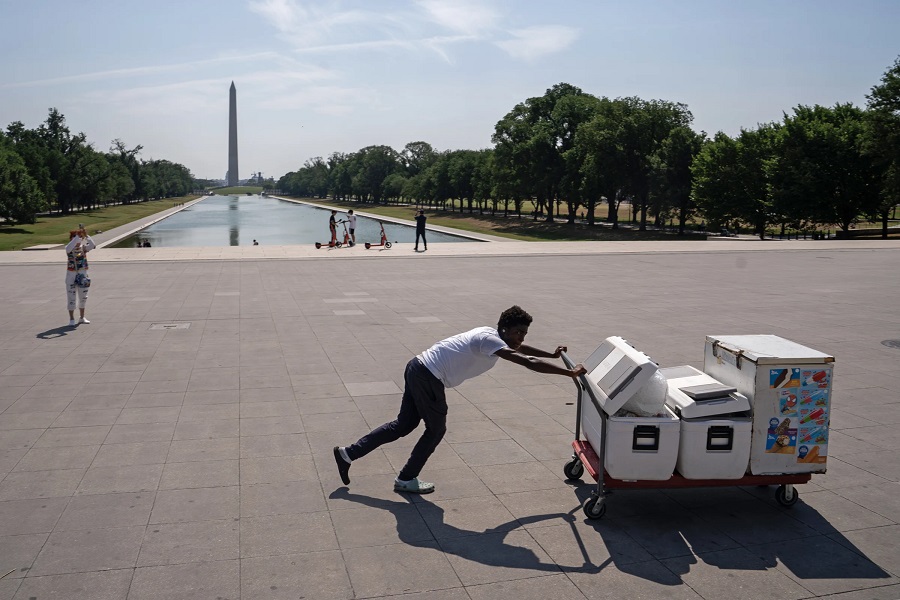11 Dec 2024

Tired Earth
By The Editorial Board

For millions of Americans, rising global temperatures have transformed summertime, pushing them to spend more and more time each year inside air-conditioned spaces, sealed off from the sweltering outdoors.
For Akshay Govind, an oral surgeon who lives in Oakland, Calif., an annual family summer vacation to Lake Chelan in Central Washington was marred this year by two hallmarks of climate change: wildfires and extreme heat.
“Depending on the direction of the winds, we either had the 100-plus degree heat, the smoke from a fire or both. That really limited our outdoor activities,” Govind told Yahoo News.
Wildfires, some sparked by fireworks set off on the Fourth of July, caused the air quality in the North Cascade Mountains to plummet and triple-digit temperatures made containing the blazes that much more of a challenge. The result was that a normally relaxing vacation spent hiking and swimming was transformed into an indoor retreat in which the fear of encroaching flames was ever present.
“Between the hours of, say, 9 a.m. and 7 p.m. it was too hot to be outside for more than 10 minutes,” Govind said, adding that the wooded lodge where his family stayed was “so remote that the fire department can’t get there if there’s a fire, so we were trained on how to use fire hoses.”
Getting hot in here
While summer is the hottest season in the Northern Hemisphere, it has been getting even hotter thanks to climate change. In every decade since the 1960s, heat waves have become more frequent, last longer and pack higher temperatures, according to data from the Environmental Protection Agency. Between 1971 and 2000, average summer temperatures rose by 1.7 degrees Fahrenheit in the U.S., and by 2.7 degrees across much of the West.
Those unwelcome facts have left many residents scrambling to adapt to summer’s new normal.
“Last summer, it was too hot to walk during the day, and we soon found out it wasn't much better at night!” Jennifer Frogerson, a customer service representative for a clothing company in Austin, Texas, said of the strolls she used to take with her partner. “I have a private pool at my condo community and last summer I couldn't even bear to hang out there, especially when humidity is high or triple-digit temps set in. I must have gone to the pool three times last summer,” she said.
Health hazards and new routines
Long periods of exposure to extreme heat are particularly bad for human health, and, on average, more than 1,300 Americans die each year due to heat-related illness. The body has to work harder when it’s hot to keep its organs at cooler temperatures. That puts strain on the cardiovascular system, increasing the risk of both a heart attack and kidney failure, according to the Centers for Disease Control and Prevention.
With summers getting hotter, that has left many Americans looking for new summertime routines that don’t involve going outside. Summer camps and summer classes have been canceled this year in places like Portland, Ore. The start of high school football season has been pushed back in states like Texas due to health risks for players. Outdoor music festivals have been canceled in places like Alexandria, Va., due to heat emergencies. While citizens of cities like Phoenix have already been forced to transition into summer routines that limit time spent outside or in unair-conditioned indoor spaces, that trend is spreading to other parts of the country.
“As a teacher, I am off in the summers and did not venture out unless necessary due to the heat,” Cleveland educator Tammi Minoski told Yahoo News. “It affects me, making me nauseous and giving me headaches.”
In recent years, this has led to a proliferation of articles with titles like, “45 fun indoor activities and things to do on a hot day,” and “How to exercise your dog when it’s too hot to go outside.” Climate scientists have warned that unless humans stop burning fossil fuels, people can expect global temperatures to keep on rising.
“For anyone who was doubting the reality of climate change 20-25 years ago, fewer reasonable people can do that now,” Govind said.
Source : yahoo.com
Comment